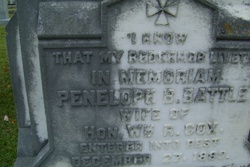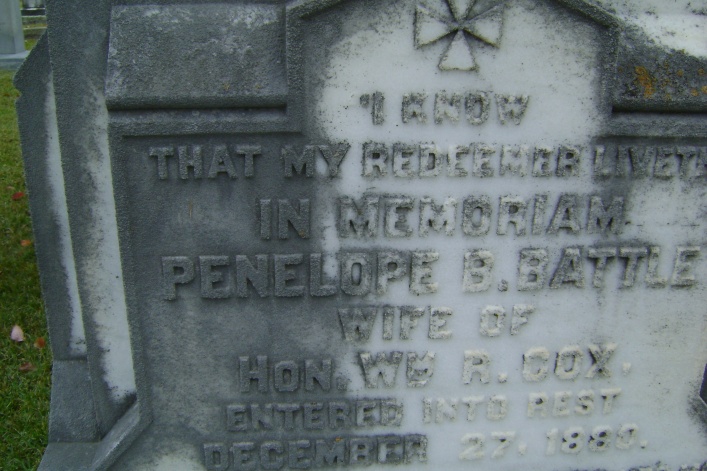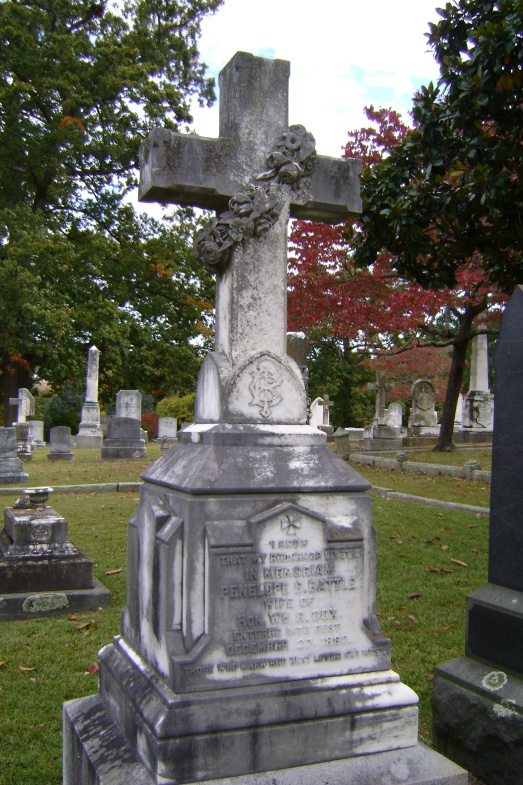Penelope Bradford Battle was born 1830 at her parent's plantation "Cool Spring" in Edgecombe County, NC, the 5th of 6 known surviving children (2 boys/4 girls) born to wealthy planter and jurist, Judge James Smith Battle and his (2nd) wife, Sallie Harriett Westray.
She was the paternal grandchild of Jacob Battle & Penelope Langley; and gr-grandchild of the prominent Elisha Battle & Elizabeth Ruth Sumner, all of Edgecombe County. She is a direct descendant of this family's patriarch, J. John Battle (1634-1691) who immigrated to the Virginia Colonies from England in 1654. On her mother's side she was the maternal grandchild of the prominent Samuel Westray, Esq. and Sallie Bradford Turner, originally from Washington Co, NC. Penelope grew up at "Cool Spring" Plantation near Tarboro, NC, built by her gr-grandfather, Elisha Battle (1723-1799) who came to Edgecombe County in 1747 from Nansemond County VA where he became Justice of the Peace and a Justice in the Edgecombe County Court. In 1760, Elisha was one of five commissioners to found and lay out the town of Tarboro.
Not only did she come from prominence on both sides of her family tree, but her siblings were all prominent citizens of North Carolina. Older sister, Cornelia Viola Battle married John Sessoms Dancy of Tarboro; sister Mary Elizabeth Battle, married (1st) wealthy planter William F. Dancy and (2nd) Dr. N. J. Pittman of Taboro; brother, William Smith Battle married Elizabeth Dancy; brother, Turner Westray Battle married Lavinia B. Daniel and took over management of Cool Spring Plantation; and youngest sistger, Martha Ann Battle married Dr. Kemp P. Battle, president of UNC-Chapel Hill.
On November 29, 1856 the 26 year old married 24-year old attorney William "Will" Ruffin Cox, the son of Thomas Cox (deceased) & Olivia Norfleet of Nashville, TN. William Ruffin Cox was a direct descendant of English born John Cox, an officer in the British navy, who emigrated to the New World and settled in Edenton, N. C., and there married into the distinguished Cheshire family. Will, who was born in Scotland Neck, Halifax County, had grown up in Nashville, TN, where his widowed mother had relocated after his father died when he was about 4 years old. William was educated in Tennessee, and studied law at Lebanon College. He was admitted to the bar in 1852, and practiced his profession successfully in Nashville until 1857.
Penelope and William started their marriage in Nashville, where their first child was born (and died), but soon after settled in North Carolina on her husband's plantation in Edgecombe County. Two years later Cox again took up the practice of law at Raleigh and entered into the political and economic life of the State, though continuing to oversee the operations of his plantation. The couple would become parents to 4 known children, who sadly, all died young: Olivia Norfleet Cox (ca. 1857-1858), James Battle Cox (1859-1860), William Ruffin Cox (1862-1868), and Pierre Bayard Cox (1867-1892).
By 1861, all of North Carolina began to steel themselves for the inevitably coming of the Civil War. Penelope's husband, who with his own means, equipped a light battery and subsequently recruited a company of infantry. Realizing his eminent fitness to command and inspire, the Governor of the State appointed him Major of the North Carolina Troops, and thus the military service of William Ruffin Cox began. The details of Maj. Cox's military exploits have been noted generously by other researchers, and there is no need to elaborate here. Following the war, the decorated veteran returned to Raleigh where he was elected solicitor of the Metropolitan District, thus discounting the boasted Republican majority of forty thousand in the State. He was then the only Democrat in North Carolina in a prominent position, but his work as Chairman of the State Democratic Committee resulted in a Democratic majority which made him the peace hero of the State. For the next decade he was prominent in political leadership in North Carolina, declining to run for Governor in order to continue his work for his party. Governor Vance appointed him judge of the Metropolitan District in 1877, which he resigned to enter the wider field of national politics, and he was elected to the 47th Congress of the United States, where his career was similarly successful.
Penelope Battle Cox would not live to see the full contribution of her husband's career. She died two days after Christmas, on December 27, 1880, reportedly while visiting in the City of Philadelphia. Her remains were returned to Raleigh where she was buried near her two sons, James Battle and William Ruffin Cox, Jr. Twelve years later her only surviving child, Pierre Bayard Cox, would join her at Oakwood, passing at age 25 in 1892.
Her 48-year old widowed husband would go on to be elected 3 times to Congress and served on some of the most important committees, notably that of Foreign Affairs and Civil Service Reform. His declaration that civil service reform is the essence of democracy will ever survive as a national legend. He was later elected Secretary of the United States Senate.
In January 1883, William married (2nd) Frances "Fannie" Augusta Lyman, the 34-year old daughter of NC Episcopal Bishop, Theodore Benedict Lyman and his wife, Anna Margaret Albert. This union resulted in the birth of 2 sons, both of whom survived into adulthood and gained fame on their own: Col. Albert Lyman Cox (1883-1965) and Capt. Francis Cox (c. 1885). Fannie died after a sudden illness in 1886, passing at the young age of 37, again leaving Senator Cox a widower; this time with 2 small sons to raise. Following her death, W. R. Cox published the small book, "In Fond and Loving memory of Fanny Lyman Cox", a bound journal of tributes and obituary notices of his well-known, well-traveled, and much beloved second wife.
In 1900, William R. Cox retired as Secretary of the Senate and returned to his Edgecombe County plantation. He lived for nearly twenty more years, during which time he served as president of his state's agricultural society and established the North Carolina Journal of Education. Cox married for the (3rd) time 1906 when he was 74 years old, taking as his bride 52-year old Richmond-born, Catherine "Kate" Cabell, the widow of CSA Capt. Herbert Augustine Claiborne, who was mother to 2 sons from her first marriage. This marriage lasted until his death in 1919. Just prior to his death on December 26, 1919, he earned a final Civil War-related distinction as one of the last-surviving general officers of the Confederate army.
After 39 years of separation, William R. Cox was buried near his first wife in Oakwood Cemetery.
Penelope Bradford Battle was born 1830 at her parent's plantation "Cool Spring" in Edgecombe County, NC, the 5th of 6 known surviving children (2 boys/4 girls) born to wealthy planter and jurist, Judge James Smith Battle and his (2nd) wife, Sallie Harriett Westray.
She was the paternal grandchild of Jacob Battle & Penelope Langley; and gr-grandchild of the prominent Elisha Battle & Elizabeth Ruth Sumner, all of Edgecombe County. She is a direct descendant of this family's patriarch, J. John Battle (1634-1691) who immigrated to the Virginia Colonies from England in 1654. On her mother's side she was the maternal grandchild of the prominent Samuel Westray, Esq. and Sallie Bradford Turner, originally from Washington Co, NC. Penelope grew up at "Cool Spring" Plantation near Tarboro, NC, built by her gr-grandfather, Elisha Battle (1723-1799) who came to Edgecombe County in 1747 from Nansemond County VA where he became Justice of the Peace and a Justice in the Edgecombe County Court. In 1760, Elisha was one of five commissioners to found and lay out the town of Tarboro.
Not only did she come from prominence on both sides of her family tree, but her siblings were all prominent citizens of North Carolina. Older sister, Cornelia Viola Battle married John Sessoms Dancy of Tarboro; sister Mary Elizabeth Battle, married (1st) wealthy planter William F. Dancy and (2nd) Dr. N. J. Pittman of Taboro; brother, William Smith Battle married Elizabeth Dancy; brother, Turner Westray Battle married Lavinia B. Daniel and took over management of Cool Spring Plantation; and youngest sistger, Martha Ann Battle married Dr. Kemp P. Battle, president of UNC-Chapel Hill.
On November 29, 1856 the 26 year old married 24-year old attorney William "Will" Ruffin Cox, the son of Thomas Cox (deceased) & Olivia Norfleet of Nashville, TN. William Ruffin Cox was a direct descendant of English born John Cox, an officer in the British navy, who emigrated to the New World and settled in Edenton, N. C., and there married into the distinguished Cheshire family. Will, who was born in Scotland Neck, Halifax County, had grown up in Nashville, TN, where his widowed mother had relocated after his father died when he was about 4 years old. William was educated in Tennessee, and studied law at Lebanon College. He was admitted to the bar in 1852, and practiced his profession successfully in Nashville until 1857.
Penelope and William started their marriage in Nashville, where their first child was born (and died), but soon after settled in North Carolina on her husband's plantation in Edgecombe County. Two years later Cox again took up the practice of law at Raleigh and entered into the political and economic life of the State, though continuing to oversee the operations of his plantation. The couple would become parents to 4 known children, who sadly, all died young: Olivia Norfleet Cox (ca. 1857-1858), James Battle Cox (1859-1860), William Ruffin Cox (1862-1868), and Pierre Bayard Cox (1867-1892).
By 1861, all of North Carolina began to steel themselves for the inevitably coming of the Civil War. Penelope's husband, who with his own means, equipped a light battery and subsequently recruited a company of infantry. Realizing his eminent fitness to command and inspire, the Governor of the State appointed him Major of the North Carolina Troops, and thus the military service of William Ruffin Cox began. The details of Maj. Cox's military exploits have been noted generously by other researchers, and there is no need to elaborate here. Following the war, the decorated veteran returned to Raleigh where he was elected solicitor of the Metropolitan District, thus discounting the boasted Republican majority of forty thousand in the State. He was then the only Democrat in North Carolina in a prominent position, but his work as Chairman of the State Democratic Committee resulted in a Democratic majority which made him the peace hero of the State. For the next decade he was prominent in political leadership in North Carolina, declining to run for Governor in order to continue his work for his party. Governor Vance appointed him judge of the Metropolitan District in 1877, which he resigned to enter the wider field of national politics, and he was elected to the 47th Congress of the United States, where his career was similarly successful.
Penelope Battle Cox would not live to see the full contribution of her husband's career. She died two days after Christmas, on December 27, 1880, reportedly while visiting in the City of Philadelphia. Her remains were returned to Raleigh where she was buried near her two sons, James Battle and William Ruffin Cox, Jr. Twelve years later her only surviving child, Pierre Bayard Cox, would join her at Oakwood, passing at age 25 in 1892.
Her 48-year old widowed husband would go on to be elected 3 times to Congress and served on some of the most important committees, notably that of Foreign Affairs and Civil Service Reform. His declaration that civil service reform is the essence of democracy will ever survive as a national legend. He was later elected Secretary of the United States Senate.
In January 1883, William married (2nd) Frances "Fannie" Augusta Lyman, the 34-year old daughter of NC Episcopal Bishop, Theodore Benedict Lyman and his wife, Anna Margaret Albert. This union resulted in the birth of 2 sons, both of whom survived into adulthood and gained fame on their own: Col. Albert Lyman Cox (1883-1965) and Capt. Francis Cox (c. 1885). Fannie died after a sudden illness in 1886, passing at the young age of 37, again leaving Senator Cox a widower; this time with 2 small sons to raise. Following her death, W. R. Cox published the small book, "In Fond and Loving memory of Fanny Lyman Cox", a bound journal of tributes and obituary notices of his well-known, well-traveled, and much beloved second wife.
In 1900, William R. Cox retired as Secretary of the Senate and returned to his Edgecombe County plantation. He lived for nearly twenty more years, during which time he served as president of his state's agricultural society and established the North Carolina Journal of Education. Cox married for the (3rd) time 1906 when he was 74 years old, taking as his bride 52-year old Richmond-born, Catherine "Kate" Cabell, the widow of CSA Capt. Herbert Augustine Claiborne, who was mother to 2 sons from her first marriage. This marriage lasted until his death in 1919. Just prior to his death on December 26, 1919, he earned a final Civil War-related distinction as one of the last-surviving general officers of the Confederate army.
After 39 years of separation, William R. Cox was buried near his first wife in Oakwood Cemetery.
Inscription
Wife of Hon. Wm. R. Cox
Family Members
Advertisement
Advertisement















